If your apartment just flooded, you’re facing more than a mess – you’re facing a legal emergency. Whether it came from a burst pipe, heavy rain, or a neighbor’s leak, the damage can be overwhelming. You might lose furniture, grow mold within days, and suddenly find your home unsafe to live in.
You may be wondering if you still have to pay rent, whether you can move out, and what your landlord is responsible for. Fortunately, Chicago tenants have rights – and those rights apply whether the flooding results from neglect or is simply a casualty loss.
Depending on the cause of the flooding, the location of your unit, and the terms of your lease, you may have legal remedies such as:
- Rent abatement (partial or full)
- Required repairs or emergency services
- Lease termination
- Reimbursement for damaged property
But these remedies each have strict rules and procedures. A misstep – even one made in good faith – can weaken your position or lead to eviction.
This article will walk you through what to do when your apartment floods, what remedies are available under Chicago’s Residential Landlord and Tenant Ordinance (RLTO), how Illinois and Cook County laws may apply, and when to consider legal action.
Key Takeaways
- If your apartment flooded, you may have legal rights to stop paying rent, demand repairs, or break your lease.
- Tenants in Chicago and Cook County have special protections under local laws like the RLTO and CCRTLO.
- Your landlord is not usually responsible for damage to your belongings – unless the flooding was caused by their negligence or failure to fix known issues.
- Legal notice requirements are strict. To protect your rights, talk to a tenants’ rights lawyer before taking action.
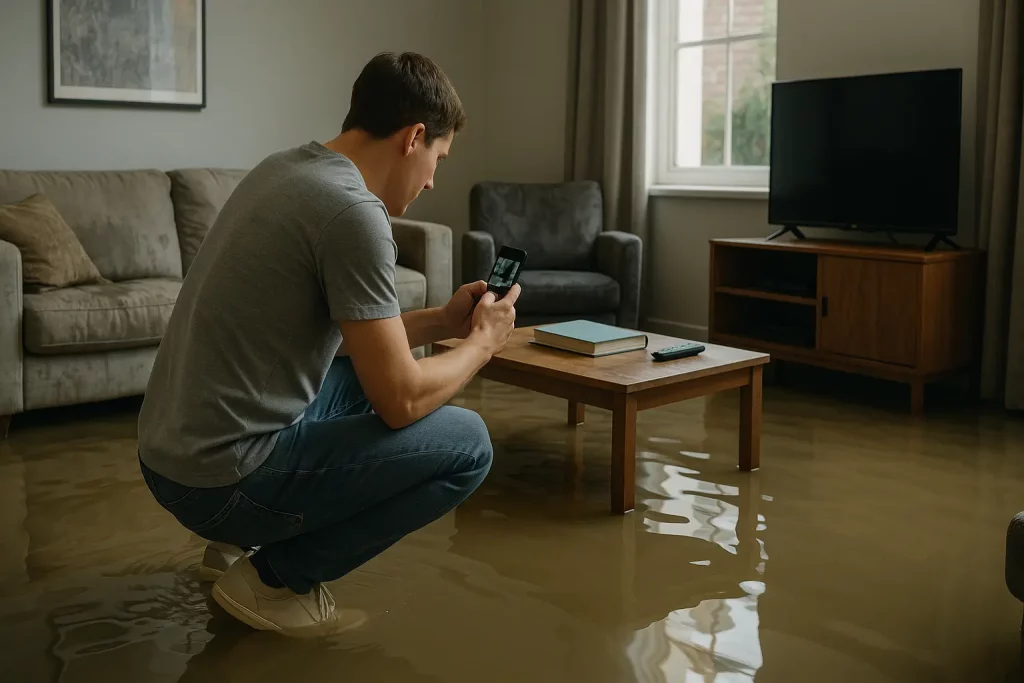
Immediate Steps to Take When Your Apartment Floods
Document the Damage
Start by documenting everything thoroughly. Take wide and close-up photos of water damage to floors, ceilings, walls, and personal belongings. Include anything that could worsen over time, such as soaked furniture, standing water, or signs of mold beginning to develop.
Videos are also helpful to capture the extent of the flooding. These records may be critical if your landlord disputes your version of events or you need to prove damages in court.
Notify Your Landlord – Immediately and in Multiple Ways
Notify your landlord as soon as possible. Use every method you have – call, text, email – but make sure at least one message is in writing and saved. A good approach is to call first, then send a follow-up email or text confirming what you discussed.
Prompt notice protects your legal position. If you delay, some landlords may argue that you caused or worsened the damage. Even if you’re unsure who is responsible, early written notice helps preserve your rights.
Consider Talking to a Tenant’s Rights Lawyer
Flooded apartments can trigger complex legal issues. A tenant’s rights attorney can help you evaluate your situation, draft proper notices, and decide whether lease termination or another remedy is best. An early consultation often means fewer problems down the road.
Once you’ve documented the damage and notified your landlord, the next step is to understand your legal options. Chicago law offers several remedies for tenants living in uninhabitable or unsafe conditions – including repairs, rent reductions, and in some cases, ending the lease altogether. Let’s start with the local law that protects most renters in Chicago: the RLTO.
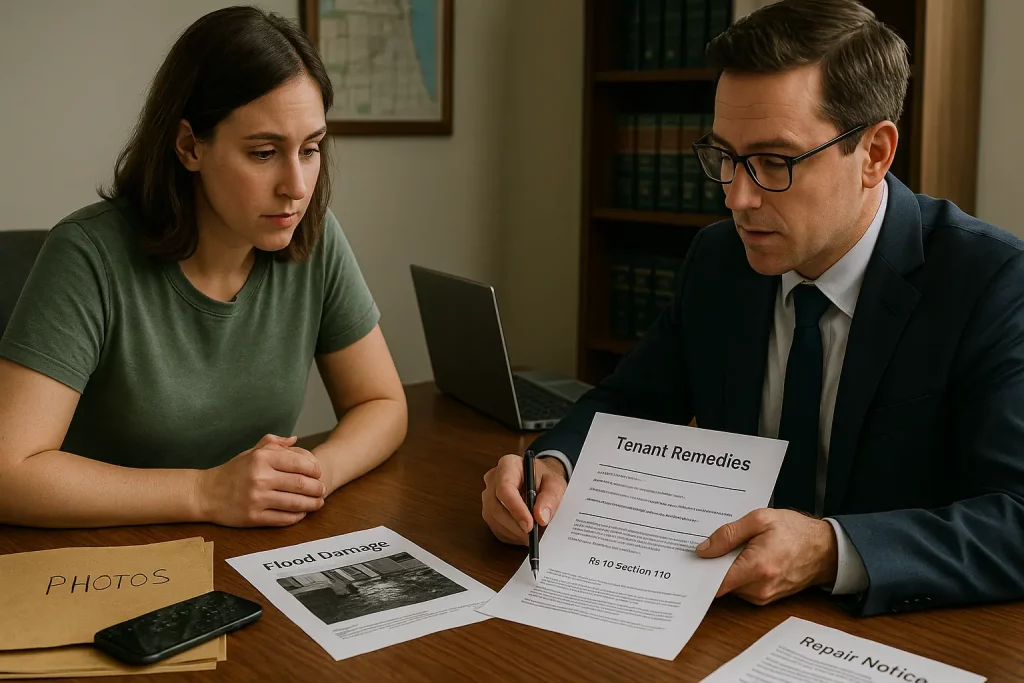
Remedies Under the RLTO (Chicago Residential Landlord and Tenant Ordinance)
If you live in Chicago, your lease is likely governed by the Residential Landlord and Tenant Ordinance (RLTO). This law gives tenants strong rights when their apartment becomes uninhabitable due to poor maintenance, flooding, or other serious problems.
Under Section 5-12-070 of the RLTO, landlords must maintain apartments in compliance with Chicago’s building code. Section 5-12-110 spells out what tenants can do if their landlord fails to meet this obligation.
Flooding often results in violations such as:
- Failing to maintain a watertight roof, floors, or foundation
- Allowing water to accumulate or failing to prevent mold or dampness
- Failing to maintain plumbing, hot water, or electrical systems
- Leaving basements or other areas in an unsanitary condition
If your situation falls into one of these categories, the RLTO gives you several options. Which remedy applies depends on how serious the damage is and whether the landlord addresses the problem after receiving written notice.
Lease Termination for Ongoing Violations (Section 110(a))
If your apartment is no longer livable due to flooding, and your landlord doesn’t fix the problem, you may have the right to end your lease.
To do this properly:
- Send a written notice to your landlord that clearly describes the problem. The notice must state that the lease will end in 14 days if the issue is not fixed.
- If the landlord does not make the repairs within that 14-day window, the lease ends automatically.
- You then have 30 days to move out. If you stay past those 30 days, the lease remains in effect.
This remedy only applies if the flooding or damage makes the unit unfit to live in. If the notice is valid and the conditions are met, the landlord must return your security deposit, any prepaid rent, and any required interest.
Lease Termination for Fire or Casualty (Section 110(g))
If your apartment is damaged by flooding, fire, or another unexpected event, you have three legal options under the RLTO:
- Terminate immediately – You can move out right away. If you do, you must send written notice within 14 days stating that you are ending the lease. The lease ends as of the date of the flood or casualty.
- Stay with reduced rent – If only part of the unit is unusable, you can stay and pay reduced rent based on how much space you lost.
- Wait and terminate later – If the landlord agrees to repair but fails to act promptly, you can send a second written notice to end the lease.
In all three situations, the landlord must return your security deposit and any prepaid rent. These rights apply even if the landlord was not at fault – but they do not apply if the damage was caused by you or someone you allowed into the unit.
Withhold Rent (Section 110(d))
If the apartment is still livable but has significant problems, you may be able to reduce your rent. To do this, you must:
- Notify the landlord in writing of the issue and your intent to withhold part of the rent.
- Give the landlord 14 days to make repairs.
- If the problem is not fixed, begin withholding a reasonable portion of the rent to reflect the reduced value of the apartment.
This option carries risk. If the court later finds that your withholding was excessive or unjustified, the landlord may sue for unpaid rent or attempt eviction. Tenants should only use this remedy with a full understanding of the risks and documentation.
Repair and Deduct (Section 110(c))
If the repair is minor and the cost is no more than $500 or half of one month’s rent (whichever is greater), you may:
- Notify the landlord in writing and allow 14 days for the repair.
- If the repair isn’t made, hire a professional and get a paid receipt.
- Submit the receipt and deduct the cost from your rent.
The work must be completed in a lawful and workmanlike manner. This option does not apply to serious flooding or damage that would cost more than one month’s rent to repair.
Essential Services Remedy (Section 110(f))
If the flooding disrupts essential services like heat, water, electricity, or plumbing, you have additional rights:
- Get services yourself and deduct the cost
- Move into substitute housing and avoid rent
- Withhold rent immediately (after 24 hours’ notice)
- Terminate the lease if services are not restored within 72 hours
These options require written notice and do not apply if the utility problem is caused by the service provider rather than the landlord.
Damages and Injunctive Relief (Section 110(e))
In all cases of material noncompliance, tenants may sue the landlord for damages or seek an order requiring repairs. These legal actions can also serve as a defense if your landlord files an eviction case.
Chicago tenants have multiple tools under the RLTO to respond to serious problems like flooding, but these remedies are highly procedural. In the next section, we’ll explore how Cook County tenants’ rights law protects tenants in suburban Cook County.
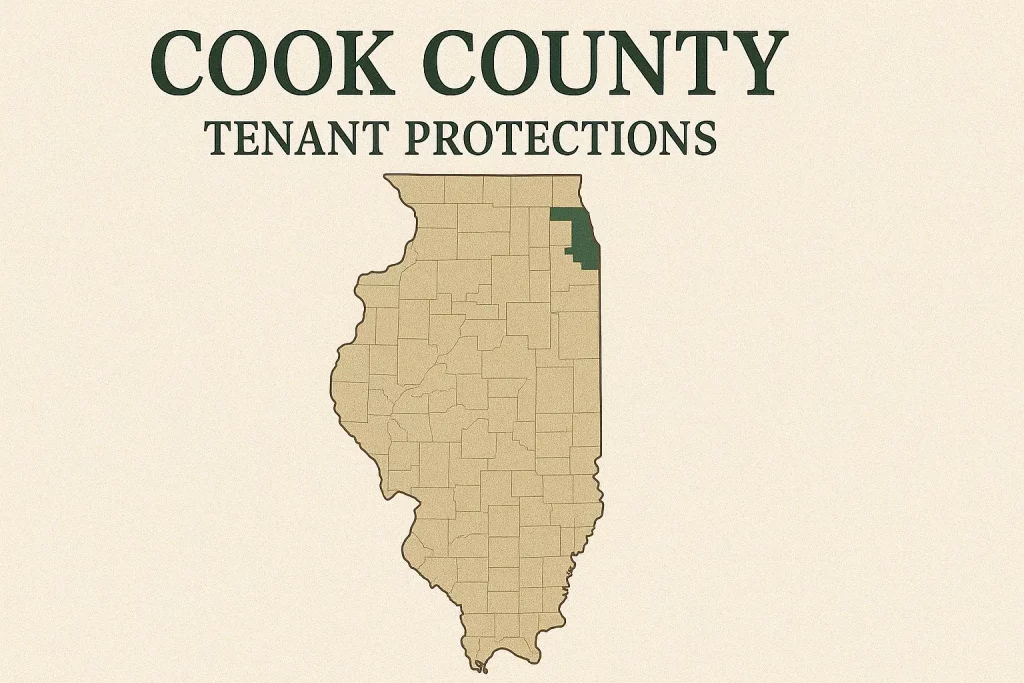
Cook County Tenant Protections When an Apartment Floods
If your rental unit is in Cook County but outside of Chicago, your rights are likely governed by the Cook County Residential Tenant and Landlord Ordinance (CCRTLO). This ordinance, which took effect in 2021, offers strong protections similar to the RLTO and applies to most suburban renters in Cook County.
Flooding is one of the clearest examples of a violation of the CCRTLO’s habitability standards. Under Section 42-105(c), landlords must maintain the premises in a habitable condition. This includes keeping the floors, foundation, plumbing, electrical systems, walls, ceilings, and roof in sound condition, good repair, and free from water accumulation. If your landlord fails to meet this standard, the law provides multiple remedies.
Withholding Rent (Section 42-106(a))
If the flooding has reduced the usable value of your unit, you may withhold a portion of the rent that reasonably reflects the diminished condition. Before doing this, you must give written notice specifying the problems and give the landlord 14 days to fix them. This remedy cannot be used if the flooding was caused by you, a family member, or a guest.
Lease Termination (Section 42-106(c))
If the flooding creates a serious habitability issue that the landlord fails to resolve, you may terminate the lease. You must give written notice of the problem and allow 14 days for repairs. If the landlord does not act, you may end the lease and vacate within the next 30 days or rental period, whichever is longer. The landlord must return your security deposit immediately after you return possession.
Fire or Casualty Damage (Section 42-106(f))
If your apartment is damaged or destroyed by flooding, you have three options:
- Immediate termination – You may vacate and send written notice within 14 days stating your intent to terminate the lease. The lease ends retroactively as of the date of the flooding.
- Partial occupancy with rent reduction – If you can still use part of the unit, your rent must be reduced to reflect the lost value.
- Termination after repair delays – If the landlord promises to repair but fails to act diligently, you may send a second notice and terminate the lease.
In each case, the landlord must return your security deposit within 48 hours of move-out and cannot charge rent beyond the date of the flood.
Essential Services (Section 42-106(e))
If the flooding disrupts essential services like plumbing, electricity, or hot water, the CCRTLO gives you several options:
- Withhold a portion of rent
- Procure services yourself and deduct the cost
- Move into substitute housing and avoid rent
- Terminate the lease if the outage lasts more than 72 hours
These remedies require written notice and are only available if the service interruption is the landlord’s responsibility—not the utility provider’s fault.
Minor Repairs (Section 42-106(g))
If the problem can be resolved for less than $500 or half a month’s rent (whichever is greater), you may fix it yourself and deduct the cost. You must first give the landlord 14 days to make the repair. If they fail, you can hire a professional, pay for the work, and submit the receipt with your next rent payment. This is only allowed for non-tenant-caused conditions.
The CCRTLO is a powerful tool for Cook County tenants, but it requires careful documentation and strict adherence to notice requirements. Next, we’ll look at the more general protections available under Illinois state law – especially for tenants living in areas where neither the RLTO nor the CCRTLO apply.
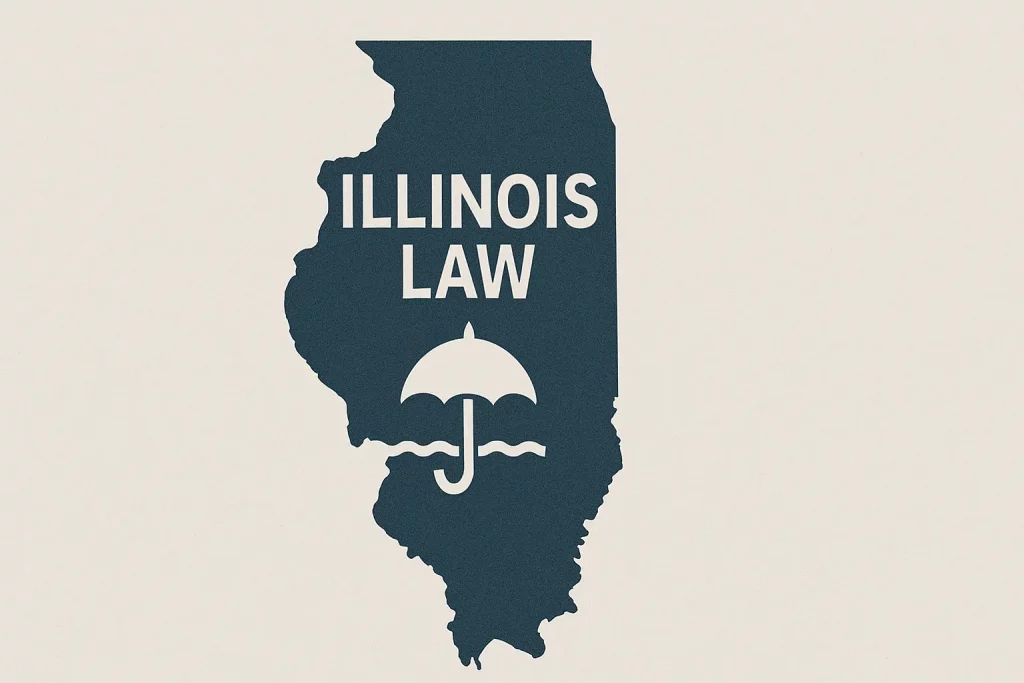
Illinois Law and Flooded Apartments
If you live outside of Chicago and Cook County, or if your unit is exempt from those local ordinances, your rights are governed by Illinois state law. While state-level protections are not as extensive as those found in the RLTO or CCRTLO, tenants still have legal remedies when flooding makes an apartment unsafe or uninhabitable.
Unlike Chicago and Cook County, Illinois does not have a single statute that outlines a tenant’s right to a livable apartment. Instead, tenants must rely on legal principles developed by Illinois courts. The most important of these is the implied warranty of habitability.
The Implied Warranty of Habitability
Every residential lease in Illinois includes an implied promise that the apartment is safe, sanitary, and reasonably fit for living. If flooding creates unsafe or unhealthy conditions that the landlord fails to fix within a reasonable time, that may be a breach of this warranty.
This warranty does not require your apartment to be perfect. But if water damage causes mold, electrical hazards, or renders part of the unit unusable, the landlord has a legal obligation to make the unit habitable again. Tenants must notify the landlord of the issue and give them a chance to repair it before asserting a claim or withholding rent.
Hidden Defects and Landlord Responsibility
Illinois law also holds landlords responsible for hidden or non-obvious defects if they knew or should have known about the problem before renting the unit. These are called latent defects. If your unit flooded because of poor drainage, a failing foundation, or deteriorated plumbing, and the landlord failed to warn you or make repairs, you may have a valid legal claim.
Example: Wanland v. Beavers
In Wanland v. Beavers, the court sided with tenants who had moved out of their apartment after repeated flooding. The landlords admitted that they knew the building was prone to floods and had done nothing to fix the issue. The court found that the defect was latent, that the landlords had failed to disclose it, and that the tenants had acted reasonably. The landlords were ordered to pay damages for the loss.
This case shows that landlords cannot avoid liability simply because the flooding was caused by bad weather. If a landlord ignores a known defect or fails to disclose serious risks, they may be held legally responsible.
How Damages Are Calculated
If a court finds that the landlord breached the implied warranty of habitability, or failed to disclose a latent defect, the tenant may be entitled to compensation. Illinois courts generally use one of two methods to calculate damages:
- The difference in value method compares what the tenant agreed to pay versus what the apartment was actually worth during the time it was damaged. If you paid $1,200 per month but the apartment was worth only $600 in its flooded condition, you may be entitled to a $600 refund per affected month.
- The percentage reduction in use method calculates damages based on how much of the apartment was unusable. If flooding made half the apartment unlivable for two months, the tenant could argue for a 50 percent rent reduction during that period.
These calculations do not cover emotional harm, but you may also be entitled to reimbursement for damaged personal property if the flooding was caused by the landlord’s negligence or failure to repair known defects.
Next, we’ll discuss how Illinois law treats personal property damage from flooding, and whether tenants can recover for destroyed belongings.
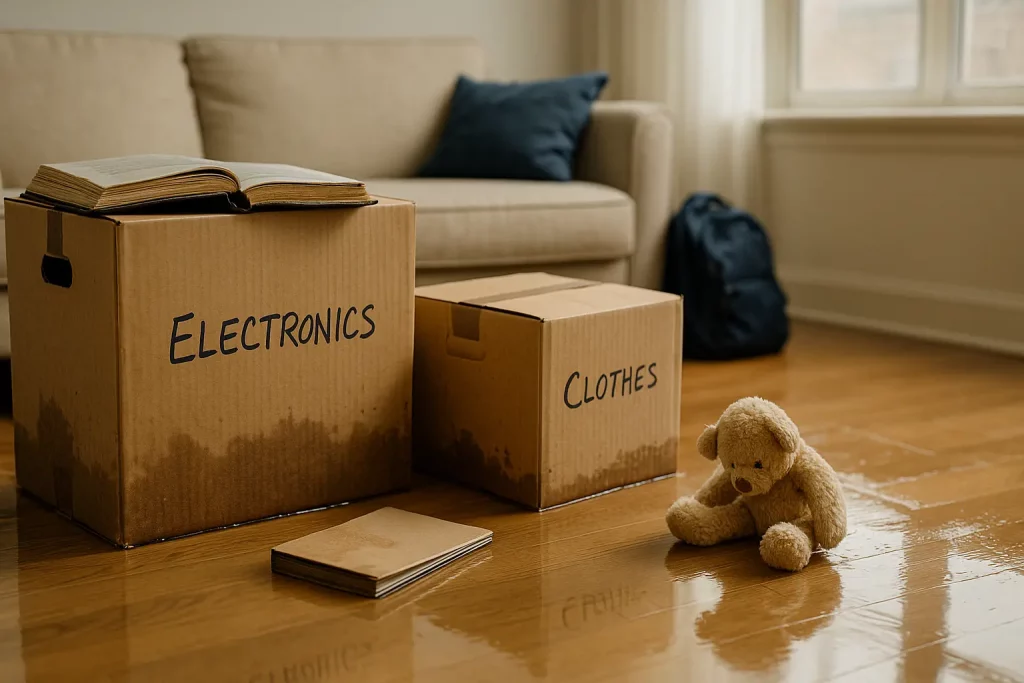
What About Damage to Personal Property?
Flooding often destroys more than just walls and flooring. Personal belongings like furniture, clothing, electronics, and keepsakes are frequently damaged or lost entirely. Naturally, tenants want to know if the landlord is responsible for replacing these items. The answer depends on where you live, what your lease says, and how the flooding occurred.
The General Rule: Tenants Bear the Loss
Under Illinois law, landlords are usually not responsible for damage to a tenant’s personal property. Most leases include language that specifically disclaims liability for loss or damage to a tenant’s possessions. These provisions are generally enforceable unless the landlord acted negligently or concealed a known hazard.
Even renters insurance does not automatically protect against all types of flooding. Standard policies often exclude water damage caused by outside flooding, unless the tenant has purchased a separate flood endorsement. Tenants in basement or garden units should strongly consider adding this coverage. Without it, there may be no coverage for the most common types of water intrusion.
Exceptions: When the Landlord Might Be Liable
There are situations where a landlord could be responsible for property damage:
- The flooding was caused by a latent defect the landlord knew about and failed to disclose
- The landlord was negligent in maintaining plumbing, roofing, or drainage systems
- The landlord promised to maintain the premises and failed to act after receiving notice
- The lease includes a warranty or repair covenant that was breached
In Chicago and most of Cook County, tenants have an additional layer of protection. Both the RLTO and the CCRTLO allow tenants to recover damages when a landlord fails to maintain a habitable unit. If personal property is lost as a result of that failure, tenants may have a stronger legal claim under local ordinance than they would under state law alone.
Most Lawsuits Over Property Damage Are Not Worth It
Even when you have a valid claim, suing your landlord over property damage is often not financially practical. Used items generally have little resale value. Courts calculate damages based on fair market value, not replacement cost. A five-year-old couch or secondhand television may not justify the time, stress, or legal fees required to bring a case.
Unless the property loss is substantial or part of a larger claim involving habitability, rent abatement, or lease termination, pursuing compensation through a lawsuit is rarely worth the effort, especially outside of Cook County.
What You Should Do
If your belongings were damaged:
- Photograph every affected item
- Gather any receipts or purchase records
- Contact your renters insurance provider to understand your coverage
- Send a written notice to your landlord, especially if the flooding was caused by a defect
- Talk to a tenants’ rights attorney if you suspect your landlord may be at fault
Even if a lawsuit is not realistic, you may have stronger negotiating leverage or other remedies depending on where you live and how your lease is written.
What Legal Claims Can You Bring After a Flood?
If your apartment flooded and your landlord failed to take reasonable steps to prevent it or respond appropriately, you may have legal claims. Which claims are available depends on where you live, what your lease says, and whether the landlord’s actions (or inaction) contributed to the damage.
Here are the most common types of claims tenants may pursue:
Breach of Lease
Your lease is a binding contract. If it contains promises about repairs, maintenance, or habitability, and the landlord fails to follow through, that may be a breach. Common examples include:
- A lease that states the landlord will maintain the plumbing, but water damage occurs due to neglect
- A lease that provides for mold remediation or waterproofing, but the landlord fails to act after flooding
Even if the lease does not include specific promises, a general failure to provide a habitable unit may still support a contract claim under Illinois law or local ordinances.
However, a breach of lease claim is typically limited to recovering financial losses like overpaid rent or out-of-pocket expenses. It does not include penalties unless the lease or local law provides them.
Negligence
Negligence claims are based on carelessness rather than contract terms. To succeed, a tenant must show that the landlord failed to act reasonably under the circumstances. For example:
- The landlord ignored reports of a leaking roof or broken pipe
- The landlord delayed obvious repairs that led to property damage
- The landlord caused damage through poor workmanship or unqualified repairs
Negligence cases can support claims for property loss and possibly other damages. But they require more evidence and are harder to win without showing clear misconduct.
Violation of the RLTO or CCRTLO
For tenants in Chicago or most of Cook County, local ordinances offer a more straightforward path to recovery. Both the RLTO and CCRTLO give tenants the right to a habitable apartment and establish specific remedies for failure to maintain that condition. These ordinances also provide:
- Penalties for noncompliance
- The right to terminate the lease
- The right to rent abatement
- Recovery of attorney’s fees and court costs
If flooding made your unit uninhabitable and your landlord did not act promptly, you may have a claim under these ordinances – regardless of whether your lease says anything about repairs or property conditions.
These local laws are especially valuable in cases where habitability was compromised for days or weeks and the landlord refused to acknowledge or fix the problem.
Next, we’ll discuss how to assess whether it makes sense to stay in your apartment or move out – and how to protect yourself legally no matter which path you choose.
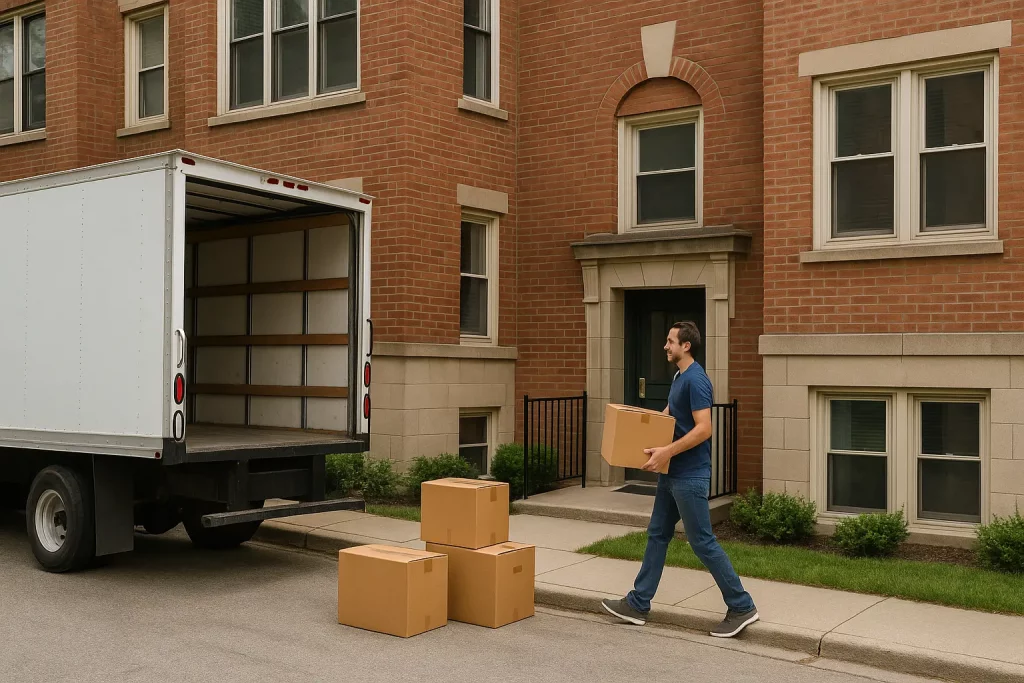
Should You Stay or Go? Strategic Considerations After a Flood
Once your apartment floods, one of the hardest decisions is whether to stay or move out. The answer depends on the extent of the damage, how your landlord responds, and your tolerance for disruption and risk. Both options come with legal and practical consequences, so it’s important to think carefully before making your next move.
When Staying Might Make Sense
If the flooding was limited, cleanup is underway, and your landlord is making real progress, staying could be viable. You might choose to:
- Seek a temporary rent reduction while the apartment is being repaired
- Stay in communication with your landlord and get repair timelines in writing
- Continue documenting the condition of the apartment in case things deteriorate again
That said, remaining in a recently flooded unit comes with risks. Flood repairs are often slow and incomplete. Mold can develop behind walls or under floors. And if plumbing or roofing issues caused the flood, they may reappear during the next storm. This is especially true in garden units or basement apartments, which are more vulnerable to water intrusion.
When It’s Time to Leave
If the unit is unsafe or your landlord is unresponsive, moving out is usually the better option. You may want to consider lease termination if:
- The apartment is no longer livable or presents a health hazard
- You’ve experienced repeat flooding or live in a unit prone to water problems
- The landlord promises repairs but fails to follow through
- The disruption is too severe to reasonably continue living there
Flooding from rain is rarely a one-time event unless caused by an extreme weather incident. If your unit flooded once due to typical rainfall, it is likely to happen again. For this reason, many tenants choose to leave early and avoid further risk.
Chicago and Cook County laws support lease termination when flooding results in uninhabitable conditions. But you must follow strict notice procedures to protect yourself legally and preserve your right to recover prepaid rent and your security deposit.
Talk to a Lawyer – Even for One Hour
You don’t need to hire a lawyer for a full-blown lawsuit. But even a one-hour strategy session can make a huge difference. A tenants’ rights attorney can review your situation, help you draft notices that comply with the law, and ensure you don’t accidentally waive your rights.
Legal advice is especially valuable if:
- You are unsure whether your unit is legally uninhabitable
- You want to break your lease but are worried about getting sued
- You’re not sure what the best next step is
A small investment in legal guidance can save you thousands of dollars and months of unnecessary stress.
Talk to a Tenants’ Rights Lawyer Before You Make a Move
Flooding can turn your living situation upside down. Whether your apartment is partially damaged or completely uninhabitable, it is easy to feel stuck. Before you take any major steps – like withholding rent, breaking your lease, or filing a claim – consider speaking with a tenants’ rights lawyer.
Even a one-hour strategy session can help you make a clear plan, avoid legal mistakes, and protect your rights from the start.
Brabender Law has helped over 500 tenants in Cook County resolve housing disputes over the past 13 years. We understand the legal landscape and how landlords and courts tend to respond. If you would like help evaluating your options, you can request a consultation by clicking here.
